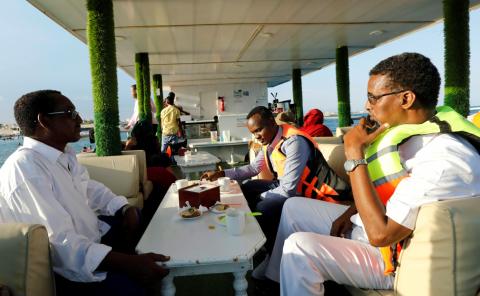Advertisement
Somalis escape to the beach and a new floating restaurant
MOGADISHU (Reuters) - Few restaurateurs consider the threat of piracy in their plans but Abdulkadir Mohamed did so for his La Lanterna floating restaurant now moored off Mogadishu's popular Lido beach.
"We considered that pirates could hijack it, and use it to attack cargo ships," he said on the top of the double-deck boat as it bounced on the warm waters of the Indian Ocean a short distance from the Somali capital's coastline.
"We made it slow," he explained, so pirates would not see it as a prize vessel to seize and use in any of their attacks.
Pirates were once the scourge of the region, chasing oil tankers and other ships and demanding ransoms for those they captured. But as Somalia has regained a semblance of stability after almost three decades of conflict and chaos, piracy has faded, even if sporadic bombings still strike the capital.
A modicum of calm means Somalis are seeking out more leisure activities outside their homes, and the Lido beach, with its bleach white sand, is drawing the crowds.
With extra security and checkpoints to protect the 2.5 km (1.5 mile) stretch of sand from possible Islamist attacks, the beach offers a place to escape from the battle-scarred capital.
"Sitting on Lido Beach, having tea or coffee in the evening, you can see different colours and feel sometimes that you are in another world," said Omar Abule, the manager of travel agent Visit Mogadishu, describing the cobalt waters and orange sunsets.
Families plunge into the water - the women from this religiously conservative country still wear their headscarves and loose garments as they sit or swim in the sea.
Visitors feeling more adventurous can don a life jacket and take a small launch to La Lanterna as it bobs near the beach. After clambering aboard, they can have a coffee or cold drink and order a snack, an opportunity to forget challenges ashore.
"I am happy to get on board such a boat," said Samira Mohammed on La Lanterna. "Coming to Lido beach gives you big hope."
Abdifitah Mohamed Siyad, director of tourism and investment in Mogadishu's local government, said the city had been ruined by wars and most people had "stories of grief".
"The remedy for the people is to create happiness for them, create an environment for tourism, a time for them to tour, a time for them to chat and forget the past," he said.
(Writing by Hereward Holland; Editing by Edmund Blair)



















Add new comment